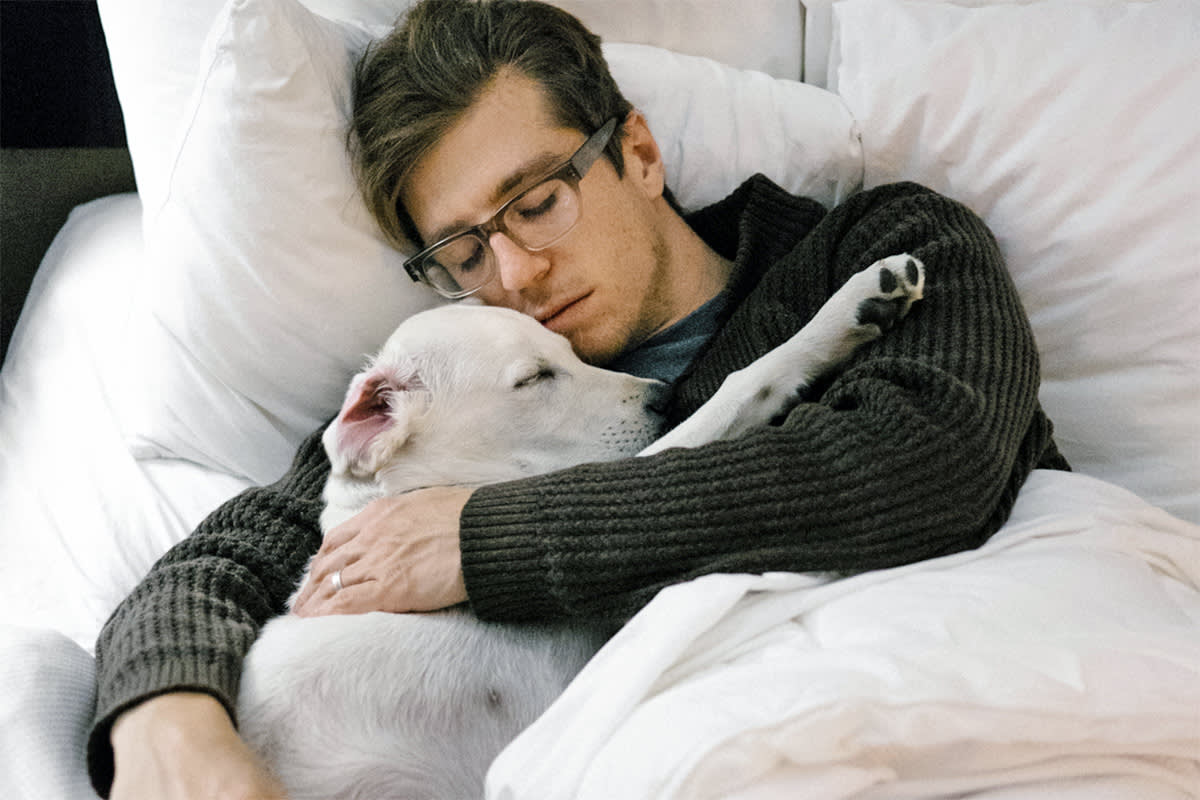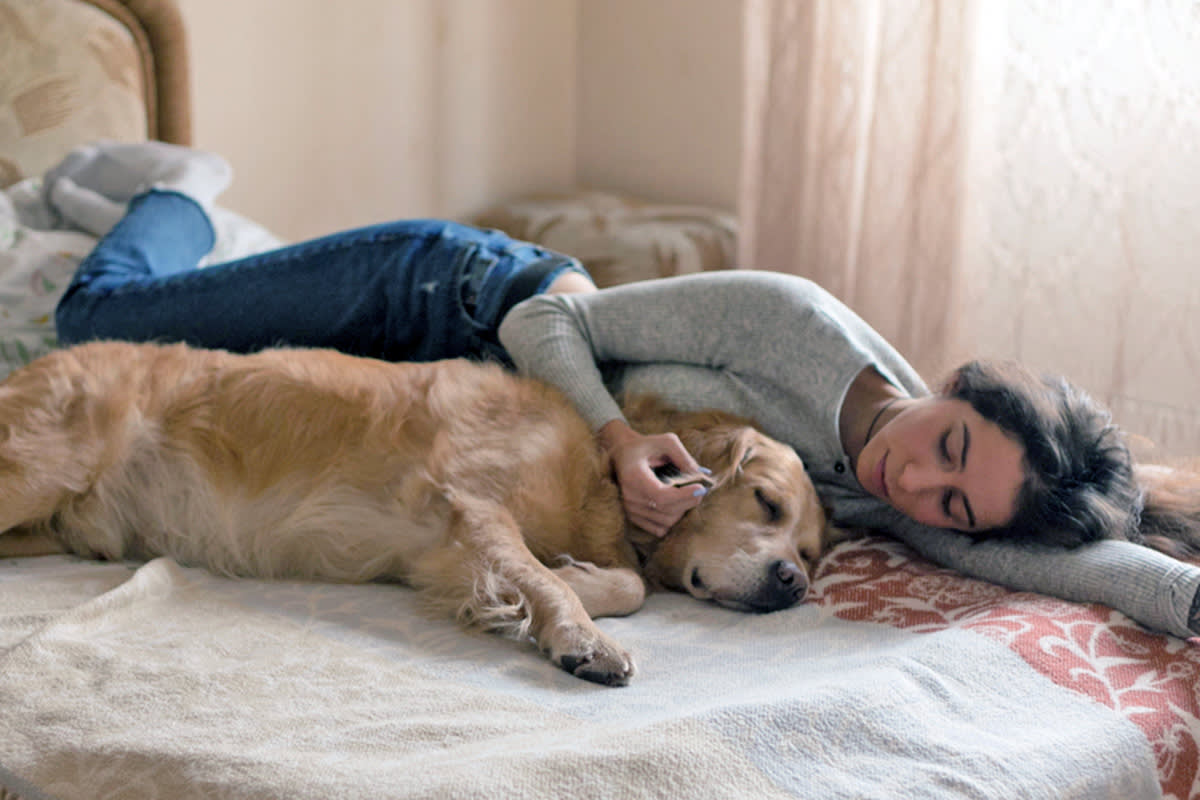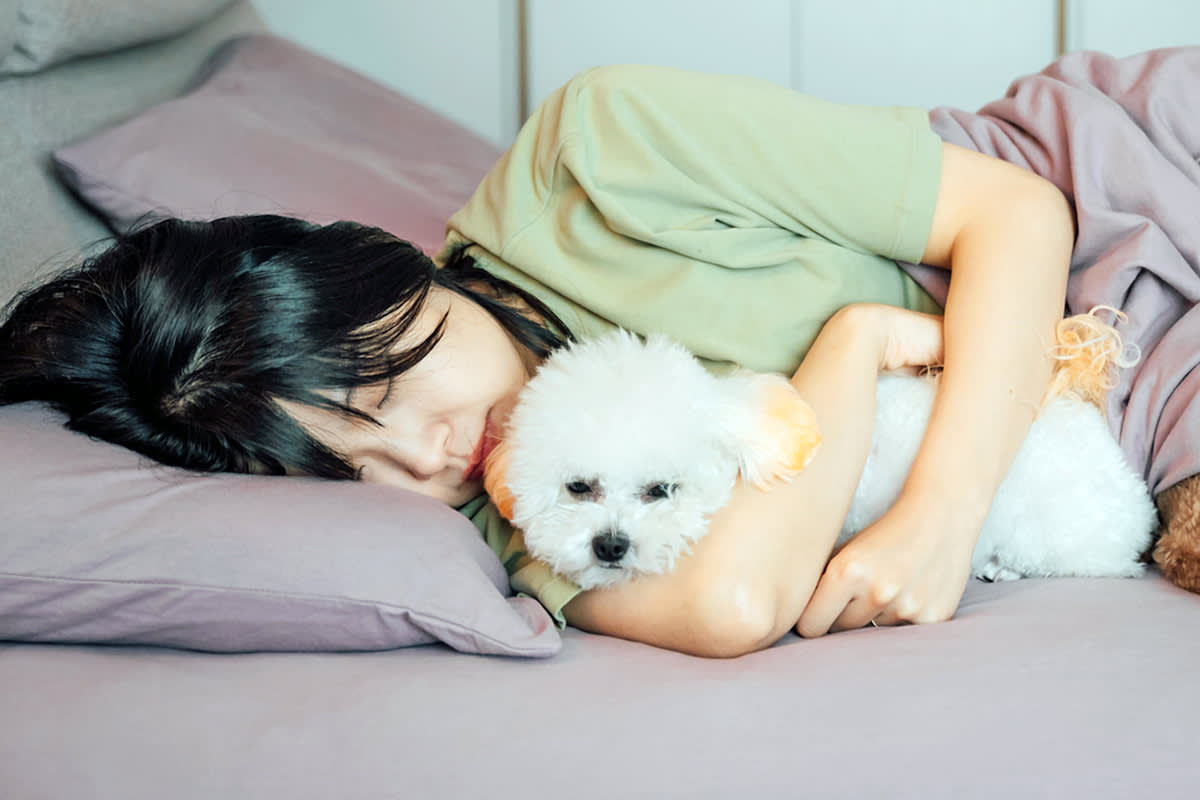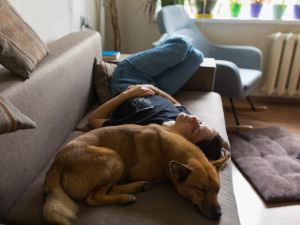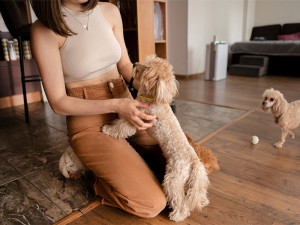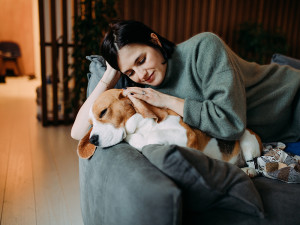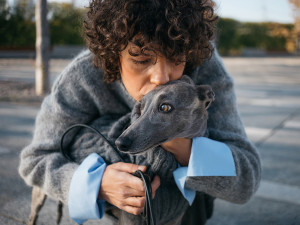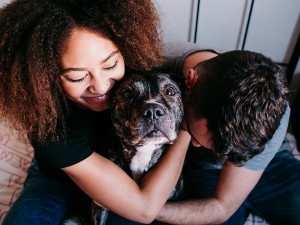Does Your Dog Get a Bad Night’s Sleep When They Share a Bed With You?
You might be stealing all the covers.
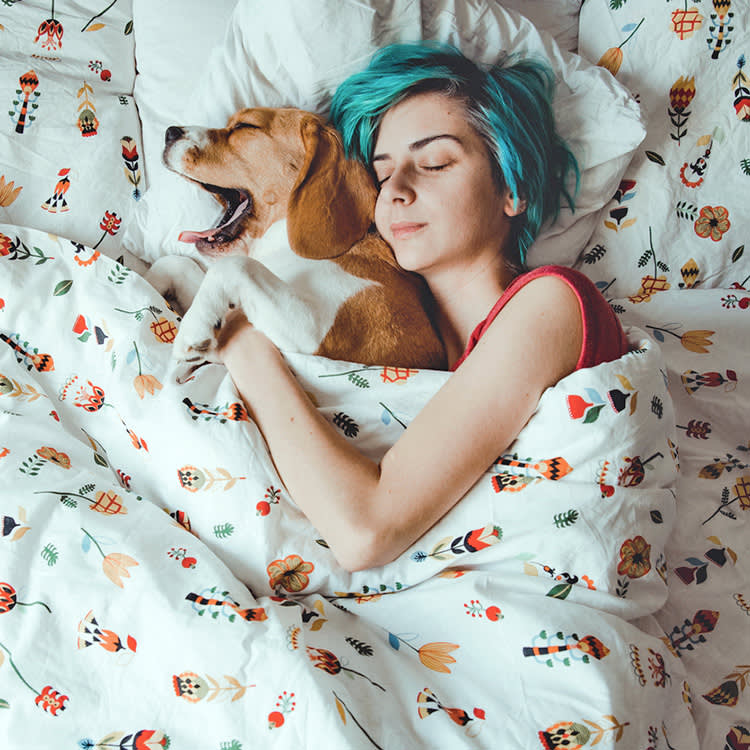
Share Article
We already know that co-sleeping (sharing a bed with your dog) can have a negative effect on the quality of your sleep, but how does it affect your dog? Do they sleep better or worse when they are curled up beside you? And what can you do to make sure they are getting the best sleep possible?
The question of whether having you next to them disrupts your dog’s sleep doesn’t have a “yes” or “no” answer. The most accurate answer is: It depends. The quality of your dog’s sleep, and where they should sleep to get the best night’s rest really depends on the dog, their sensitivities, and how restless you are. Here are some important things experts say you should consider.
How much sleep does your dog actually need?
Little-to-no formal research has been done into exactly how much sleep dogs need, but it’s a lot — probably around 11 hoursopens in new tab, but possibly as many as 16 hours depending on the dog and whom you ask. Puppies and older dogs generally require more sleepopens in new tab than dogs in their prime and larger dogs need more rest than smaller dogs. And while all dogs are polyphasic — meaning they need multiple sleep periods throughout the day — working dog breeds can generally go longer between rest periods when properly engaged.
Why do they need so much sleep? It may have something to do with their REM cycles. According to the American Kennel Clubopens in new tab (AKC), only about 10 percent of a dog’s sleep is REM sleep, while for humans it is closer to 25 percent. As a result, dogs likely need more overall sleep time to achieve the right amount of restorative REM sleep.

In addition to proper sleep, dogs, like humans, also need time to loaf. Per veterinarian Dr. Sandra C. Mitchellopens in new tab, this wakeful relaxation makes up about 30 percent of a dog’s time and is essential for their overall wellbeing.
What happens if your dog doesn’t get enough sleep?
“I see quite a few behavior issues caused or exacerbated by poor sleep,” says Allie Bender, a certified dog behavior consultant and founder of Pet Harmony Animal Behavior & Trainingopens in new tab. “In general, these issues are related to stress and anxiety. Dogs with reactivity issues, for example, often become more intensely reactive, are quicker to react, and/or react for longer when they don’t get enough quality sleep. Just like with humans, it’s hard for dogs to manage stress when they’re tired.”
Exactly how sleep deprivation will affect a dog’s behavior depends on the dog. “I worked with a dog that would sometimes growl at his [people] when they tried to leash him for his morning walk,” says Jessica Jacobson, a dog behavior expert and trainer at Dapper Dog Trainingopens in new tab in New York City. “He would also growl at other dogs on his walk, but neither behavior was consistent.”
Jacobson interviewed the dogs’ parents and found that the husband had an erratic sleep schedule and would sometimes stay up until 4 in the morning, while his wife went to bed much earlier. “A lot of times dogs only go to bed when the last person in the house does the same,” Jacobson says. She instituted a bedtime for the dog, and the growling stopped.
Just like in humans, sleep deprivation in dogs can also lead to lethargy during the day. According to a study published in 2022opens in new tab, lack of sleep among dogs led to inactivity and decreased play and alert behaviors. The study also found that male dogs were more impacted by sleep deprivation than female dogs and that overall, “dogs appear to compensate for the lack of sleep during the night by remaining inactive during the day.”
In addition to various psychological and behavioral effects, sleep deprivation can also make dogs more prone to infections, threatening their overall health and life expectancy.
How do you know if your dog is getting enough quality sleep?
Dogs tend to sleep when their humans sleep or are not around, so observing their sleep in real time can be difficult. That said, most dogs can sleep through the night, Bender adds. So, if you notice your dog is getting up a lot, they are probably not getting the restorative sleep they need.
You might also notice that your dog is more easily disturbed during the day — jolting awake every time someone walks by or they hear a noise. This is proof that they are not sleeping well at these times and could be indicative of larger sleep issues, especially if you also notice changes in their behavior.
But why isn’t your dog getting enough sleep?
It could be that they are ill or in pain, so if you notice that your dog is suddenly sleeping worse than usual, take them to the vet for a check-up.
A lack of proper sleep could also be the result of a change in their environment or sleep schedule. Maybe a house on your block just started construction, and your dog is sensitive to the noise. Or maybe you changed something around in your bedroom, and they simply don’t respond well to change. Bender also noticed an uptick in sleep deprivation-related behavior at the start of the pandemic when humans were suddenly home all the time, which interrupted their dogs’ established nap routines.
If your dog sleeps in the bed with you, that could also be a factor, especially if you are a big snorer or have a tendency to toss and turn. Some dogs don’t mind being woken up by the occasional errant flailing limb or thundering intake of breath, but others find it stressful and anxiety-provoking and struggle to settle down again after.
How can you help your dog sleep better?
Making sure your dog has plenty of enrichment and gets lots of exercise and play time every day is essential. The more worn out your dog is when they go to bed, the better they will sleep.
Some dogs want to sleep in your bed simply to be near you, but it’s also possible that your bed is just more comfortable than theirs, and they want the warmth of your body heat. To make their bed more comfortable and appealing, try adding a memory foam pad to your dog’s bed and a heating element.
If someone in your house is a night owl, setting a bedtime for the dog can be a big help. Jacobson’s clients managed this for their dog by having the husband bring the dog into the bedroom when his wife was going to sleep and then quietly exit once the dog was settled. Eventually, the dog got used to going to bed on the wife’s schedule without the husband’s escort.
And if you’ve tried all these things, and your dog still seems sleep-deprived, contact a dog trainer and set up an appointment. They will be able to observe the situation from the outside, seeing things you can’t and providing you with the help you need to get your dog’s sleep back on track.
References:
Clark, Heidi. “American Kennel Club.” American Kennel Club, 23 Aug. 2016, www.akc.org/expert-advice/health/why-do-dogs-sleep-so-much/.
Ryan, Tom. “How Much Sleep Your Dog Needs.” Sleep Foundation, 22 June 2021, www.sleepfoundation.org/animals-and-sleep/how-much-do-dogs-sleep.
Schork, Ivana Gabriela, et al. “The Cyclic Interaction between Daytime Behavior and the Sleep Behavior of Laboratory Dogs.” Scientific Reports, vol. 12, no. 1, 10 Jan. 2022, p. 478, www.nature.com/articles/s41598-021-04502-2, https://doi.org/10.1038/s41598-021-04502-2.

Charles Manning
Charles Manning is an actor and writer based in New York City. In his free time he likes to cook, go swimming at the public pool, volunteer at the LGBTQ senior center, and foster senior and special-needs cats. His work has previously appeared in Cosmopolitan, Elle, Marie Claire, Harper’s Bazaar, Seventeen, and Nylon.
Related articles
![Woman wearing a black t-shirt and jeans laying on the couch with her dog taking a nap]()
What Are the Effects of Sleeping With Your Dog in Bed?
There are pros and cons of sleeping with your dog—for both of you.
![A woman sitting on a floor playing with her dogs.]()
How to Know if Your Dog Has Imprinted on You
If they’re following you around like your shadow, there’s a reason for that.
![Dog with sleep startle reflex. Woman lays on her couch and gently wakes up her dog]()
Why Does My Dog Freak Out When I Wake Them Up?
“Let sleeping dogs lie” is more than just a confusing old saying.
How to Tell If Your Dog Is a Hugger—Or Not
Boundaries, folks. Boundaries.
![Couple hugs their merle Boxer]()
How to Improve Your Relationship with Your Dog
Animal behaviorist Dr. Karen B. London on how to strengthen your pet-parent bond.

